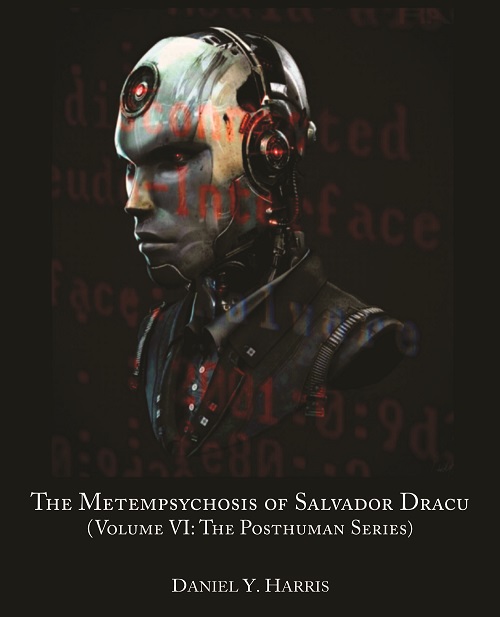
A Review of The Metempsychosis of Salvador Dracu, Part VI of The Posthuman Series
by Joshua Martin
Part VI of Daniel Y. Harris’ The Posthuman Series, The Metempsychosis of Salvador Dracu (BlazeVOX, 2023) further pushes Harris’ project as an extreme experimentalist forward. Harris has created a kind of modern day Merz filled with, instead of the physical trash of the 20th century, all the many incarnations of digital and cyber debris fused into an immense amalgam of dense poetics mingling words, numbers, symbols, code, script, and nearly anything and everything else in between. A 21st century Dada filled to brim with digital nonsense and encoded beauty. The sections (themselves numbered in a disorienting manner, i.e. 2.14121, 3.3521, etc., which follow the infrastructure of Ludwig Wittgenstein’s Tractatus Logico Philosophicus) range from a word or a line to large blocks of nearly indecipherable text, all building upon each other as part of this vast and monumental ongoing experimental project.
This work is filled with neologisms and portmanteaus to rival Khlebnikov’s or Joyce’s greatest achievements (and just as untranslatable!). Harris’ work, which he dubs posthuman, could be called post-language, post-syntax, and certainly post any conventional poetic form we’ve come to expect or understand. Throughout The Metempsychosis of Salvador Dracu, Harris challenges not only what writing is and can be but also what it even means being human in this noisy, cluttered, and overwhelming age of information and technology. This project suggests a means of integrating the entire language of cyberspace with our conventional language(s) to form a highly idiosyncratic, fascinating, and disarming poetic vocabulary reaching to the farthest possible future, while also astutely representing our present age.
Nothing about this work can be easily classified or understood (if its even supposed to!). Harris’ work represents the absolute best of the notion of experimental writing. This book is for the most adventurous of readers who are willing to have their brains fried by a veritable feast of linguistic gymnastics. No one should go into this work expecting to be anything less than absolutely disarmed and sent into disarray by this captivatingly obscure, unclassifiable, and unbelievably erudite project.
The Posthuman Series requires anyone approaching it to question all their notions of what literature is, what can or does make sense, and where poetics can or might go as our lives become increasingly consumed by screens, our experiences rendered by algorithms written by coders in a language most of us cannot and do not understand. In this sense, Harris’ project is aligned perfectly with our times, as he collects all the overwhelming madness of our digital world, rearranges it into an amazingly expansive and all-encompassing poetics that reaches beyond all languages (there are many languages scattered throughout the text, not just English) to create a blueprint in poetry for the computerized (posthuman?) mind.
The words, forms, and phrases of The Metempsychosis of Salvador Dracu pass through our minds at a dizzying rate offering us little chance to catch our breaths. This is the Dada of now. Everything is intangible, massive, filled with more information than we’ll every be able to comprehend. We, as readers, can only succumb to its extremes and allow ourselves to be consumed by the massive scale of this undertaking, in awe of Harris’ skill, innovation, and fortitude. This is literature that makes us question everything, which is, after all, what art and, in particular, experimental art should make us do.
Daniel Y. Harris’ The Metempsychosis of Salvador Dracu is available here from publisher BlazeVOX.
